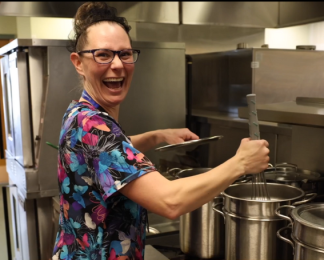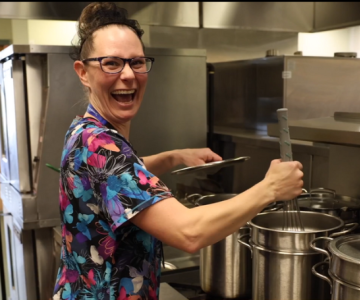Breadcrumb
Advance Care Planning
Advance care planning starts with you! It's about thinking ahead, having discussions and writing down what’s important to you so your loved ones and health-care team can honour your wishes if you're unable to speak for yourself. Use IH’s My Advance Care Plan to get started.

Advance care planning overview
Advance care planning is thinking about and writing down your wishes or instructions for present or future personal and health-care needs in case you are not able to make decisions for yourself. It involves reflecting on spiritual, cultural, emotional and mental aspects of your well-being and how these topics guide your own advance care planning.
These wishes or instructions are then summarized into an advance care plan. Advance care planning is not a one-time task. Talk with your loved ones and your health-care team about the kinds of care you do or don't want to receive. Don't assume that they know what you want.
The Advance Care Planning Is For Everyone brochure offers an introduction to advance care planning and provides information on the importance of thinking and learning about the five steps of advance care planning.
View Advance Care Planning Is For Everyone brochure
The Advance Care Planning graphic is a visual representation of the ACP process and possible stages of a person’s health journey. Its nautical theme reflects the beautiful and unique nature of British Columbia. Each wave represents a progressive change in a person’s health condition:
- Thinking Ahead
- Health Event
- Chronic Illness or Injury Progression
- Advancing Illness
- End of Life
Why advance care planning is important
We make our best decisions when we are calm and able to set time aside to think about what matters most to us. It is helpful to think and talk about advance care planning before we are in a stressful situation or medical crisis. Even if you’re feeling well and healthy now, it’s a good idea to be prepared in case you become suddenly unwell and not able to make decisions for yourself.
If you do not talk about your wishes or write down your instructions, your loved ones and health-care team will be left to make decisions for you that they believe are in your best interest. Completing your advance care plan helps to avoid unwanted medical treatments or unintended conflicts between loved ones. The B.C. Ministry of Health encourages all adults to think about advance care planning. A variety of resources are available on the Ministry’s website.
The 5 steps of advance care planning
Advance care planning helps you to:
THINK about your values, beliefs, wishes and goals of care.
LEARN about your health, medical care options and the role of a Substitute Decision Maker (SDM).
DECIDE what health care you want to accept or refuse, and who will be your SDM.
TALK about your wishes with your loved ones, SDM and health care providers.
RECORD your wishes by writing them down in your My Advance Care Plan workbook. Keep all your ACP documents together and let your SDM know where they can be found. This recorded information becomes your advance care plan.
Watch Five Steps of Advance Care Planning to see how these simple steps can help you get started today.
My Advance Care Plan - Communicating your wishes
An advance care plan is made up of documents that record your specific health-care wishes and instructions. An advance care plan includes a range of topics from:
- Personal beliefs, values and wishes
- Health-care treatment options
- Assignment of representatives (substitute decision maker) to help with financial and health-care decisions
We've created the My Advance Care Plan workbook that's easy to access, easy to use and easy to share. This workbook is a companion to the Advance Care Planning Is For Everyone brochure and walks you through the five steps of advance care planning.
You can complete the My Advance Care Plan electronically by downloading and saving it to your computer. Or, you can print a hard copy and complete it on paper. If you don't have access to a printer, please ask your health care provider or contact your local, Home and Community Care office to provide you with a printed copy.
This is a living document that should be updated as circumstances change throughout your life. To be sure that your wishes are known and followed, consider sharing parts or all of your advance care plan with appropriate health-care providers or loved ones. Your advance care plan is a helpful document that guides decisions by your health-care team and/or substitute decision maker in the event that you are unable to make them for yourself.
Making decisions on your behalf
The B.C. Adult Guardianship framework is a package of six laws that provide tools for adults to plan ahead for their legal, financial, health and personal care, or to be protected if they are unable to plan ahead. The process of assigning another person to make decisions on your behalf is complex and can be confusing. Documents and processes are in accordance to provincial legislation and each has specific purposes.
The Public Guardian and Trustee of British Columbia has created a helpful table that describes the various options for individuals to manage their financial, legal and personal affairs. For more information on personal or health care planning documents, visit the B.C. Ministry of Health Incapacity Planning.
You may find it helpful to consult a legal expert for advice and guidance on completing various legal documents.
Advance Directive is a legal document that includes your written instructions for consent or refusal of health-care treatment options. If you have chosen a substitute decision maker, they must follow the instructions in your advance directive.
The legal requirements for an advance directive are that it be in writing and signed by you when you are capable, and that it be witnessed by two adults or one person if the witness is a lawyer or notary public.
The witnesses must:
-
Be 19 years of age or older
-
Be able to understand the type of communication or language you use, unless an interpreter is present
-
Not be a person who provides paid personal care, health-care or financial services to you (other than a practicing lawyer or notary public) or be that paid person’s spouse, child, parent or employee
It is recommended that you provide a copy of your advance directive to members of your family and health-care team who are leading your care (e.g., your physician/nurse practitioner, home care nurse).
Representation agreements are legal documents that allow you to plan for the possibility of future incapability. These are tools that allow adults to name another person to manage their personal and health-care needs and financial matters in the event they are not able to on their own. There are two types of Representation Agreements: Section 7 and Section 9.
With the Representation Agreement (Section 7) Form you may name a representative to help make decisions or make decisions on your behalf, with respect to personal care and health care, the routine management of financial affairs and obtaining legal services and instructing counsel. Section 7 Representation Agreements cannot:
- Make, or help you make, decisions to refuse health care necessary to preserve life
- Physically restrain, move or manage you (or allow someone else to do so
- Make decisions about admission to facility-based care (e.g., nursing home, long-term care).
With the Representation Agreement (Section 9) Form you may name a representative to do anything that the representative considers necessary in relation to your personal care or health care, including any of the following:
-
Decide where you are to live and with whom, including whether you should live in a care facility
-
Decide whether you should work and, if so, the type of work, the employer, and any related matters
-
Decide whether you should participate in any educational, social, vocational or other activity
-
Decide whether you should have contact or associate with another person
-
Decide whether you should apply for any licence, permit, approval or other authorization required by law for the performance of an activity
-
Make day-to-day decisions on your behalf, including decisions about your diet or dressz
-
Give or refuse consent for your health care, even if you refuse to give consent at the time the health care is provided
-
Despite any objection by you, physically restrain, move and manage you, and authorize another person to do these things, if necessary to provide personal care or health care to you
Your representative does not have the authority, unless specifically stated in the representation agreement:
-
To make arrangements for the temporary care and education of your minor children, or any other persons your care for or support
-
To interfere with your religious practices
-
To make decisions identified under section 34 (2) (f) of the Health Care (Consent) and Care Facility (Admission) Act
In a representation agreement made under this section, if a representative is provided the power to give or refuse consent to health care for the adult, the representative may give or refuse consent to health care necessary to preserve life.
More information can be found at Representative Agreements and Enduring Power of Attorney.
A power of attorney and an enduring power of attorney are legal documents that appoint one or more persons to handle your financial and legal affairs. In this case, "attorney" does not mean a lawyer. Your attorney could be your spouse, a family member or close friend whom you trust implicitly. Neither power of attorney nor enduring power of attorney covers personal or health-care matters.
The power of attorney is only valid while you are capable to make your own decisions. The authority of the power of attorney ends as soon as you become unable to make decisions for yourself.
The authority of the enduring power of attorney is valid while you can make your own decisions remains in place if you become unable to make decisions for yourself.
You may choose to have both a power of attorney and an enduring power of annttorney. Your attorney can be the same person. You can restrict or limit your attorney to specific dates and/or tasks.
A substitute decision maker (SDM) is a person you choose in advance to make health-care decisions for you in the event that you can't make them for yourself, e.g. at end of life or if you are severely injured or during other medical emergencies.
You appoint your SDM by completing a Representation Agreement (Section 7) form and/or a Representation Agreement (Section 9) form. In general, an SDM can agree to or refuse treatment and can withdraw treatment on your behalf. Your SDM can use the information in your advance care plan, statements made by you in the past, and what he or she knows about you personally to make these decisions. Be sure to note there are different decision-making authorities given to the SDM depending on which representation agreement you complete. The laws regarding a substitute decision maker vary from province to province.
A temporary substitute decision maker (TSDM) is chosen by the health-care team if you have not legally named an individual (representative) to make health care decisions for you when you are incapable of making them yourself. The TSDM is chosen by the health care provider from an ordered list that is determined by B.C. law.
To be able to act as a TSDM, the person must be 19 or older, be capable, have no dispute with you, and have been in contact with you in the past year. In the absence of a Representation Agreement, the health care provider will contact the individuals below in this order:
- Your spouse (married, common-law)
- An adult child (19 or older, birth order doesn’t matter)
- A parent
- A sibling (birth order doesn’t matter)
- A grandparent
- A grandchild (birth order doesn’t matter)
- Anyone else related to you by birth or adoption
- A close friend
- A person immediately related to you by marriage
You may not change the order of this list. A person lower down on the list may only be chosen as your TSDM if all the people above them do not qualify or are not available. If you know that you want someone lower on the list to make your health care decisions, then you should legally name that person as your representative using a Rep 7 or Rep 9 agreement.
A TSDM has limited authority and is selected on a decision-by-decision basis. More information can be found at the Public Guardian and Trustee of British Columbia website.
If you become incapable and have not already named someone to make decisions for you, the B.C. Supreme Court may appoint someone close to you or the Public Guardian and Trustee of British Columbia to make decisions on your behalf. There are two types of committeeship:
- A committee of person makes decisions on your behalf regarding your personal care, health care, and living arrangements of you and/or your dependents, if you are not capable of making these decisions yourself.
- A committee of estate has full responsibility for your financial and legal affairs.
More information and resources can be found on the Public Guardian and Trustee of British Columbia website.
Medical Orders for Scope of Treatment (MOST)
Medical Orders for Scope of Treatment (MOST) is a medical order, completed by your physician or nurse practitioner, following a conversation with you about your personal goals and wishes and what level of care you wish to receive.
When you learn that you have an illness that may shorten your life, you may want to speak with your physician or nurse practitioner about receiving care that will help you stay comfortable without prolonging your life. You may also talk about whether you want to be revived (resuscitated) when your illness reaches its last stages and your heart and breathing stop. In any medically urgent situation, especially when you cannot speak for yourself, it’s important that the health-care team understands your expressed wishes for treatment and care.
If you have completed an advance directive or an advance care plan, they should align with your MOST designation. If you have both an advance directive and a MOST, the health-care team, by law, must follow what you have written in your advance directive.
Talking with your physician or nurse practitioner about care at the end of life will help you to better understand.
- Your health condition
- Possible treatment choices
- Options for care that are best for you
- Which MOST designation best reflects your situation
The results of these discussions will be your physician or nurse practitioner completing the MOST Form with you.
Request a Greensleeve
A Greensleeve is a green, plastic pouch that holds your important advance care planning (ACP) documents. It's best to keep your Greensleeve on or around your refrigerator as this is where paramedics are trained to look if they are called to an emergency.
View image of Greensleeve pouch
A Greensleeve is especially helpful for individuals who are receiving Home Health Services and/or attending out-patient clinics, i.e. renal, diabetic, cancer, etc. The Greensleeve is meant to be taken with you to clinic appointments or hospital visits so that health care providers know your wishes, advance directive and/or goals of care. It will be reviewed with you and returned for you to bring home again. You can also give a copy of your ACP documents to your doctor or nurse practitioner so they have a copy in your patient record.
For more information read the Greensleeve Guide: Individuals and Families.
Greensleeves are available for residents of Interior Health and can be obtained by:
- Asking a health-care provider at a clinic or Home and Community care office
- Emailing the Advance Care Planning team and providing your mailing address (please limit your request to two Greensleeves)
Additional advance care planning resources
There are a number of resources that can help you start the conversation about advance care planning:
- Advance Care Planning (BC Centre for Palliative Care)
- Advance Care Planning (BC Ministry of Health)
- My Voice - Expressing My Wishes (BC Ministry of Health)
- Approach to Decision Making & Advance Care Planning (Canadian Virtual Hospice)
- Advance Care Planning Across Canada (Canadian Virtual Hospice)
- Living My Culture (Canadian Virtual Hospice)
- Advance Care Planning (First Nations Health Authority)
- Your Care, Your Choices (First Nations Health Authority)
- What is Advance Care Planning? (HealthLink BC)
- Advance Care Planning: What to Include (HealthLink BC)
- Care at the End of Life (HealthLink BC)
- Public Guardian and Trustee of British Columbia
- Advance Care Planning (Seniors BC)
- Seniors First BC
- Advance Care Planning Canada
- Coming Full Circle: Planning for Your Care (Canadian Virtual Hospice)
- Planning for my Care - for people who identify as Two-Spirit and LGBTQ+ (Canadian Virtual Hospice)
- Advance Care Planning Hub (BC Centre for Palliative Care)
Contact the Advance Care Planning team
Contact Advance Care Planning with your questions by sending us an email.


Those with dementia need special consideration during the holidays. Read our tips and advice to make the holidays enjoyable for everyone.
/stories/supporting-loved-one-dementia-during-holidays


Loreen’s ability to keep calm under pressure, paired with her caring nature, have been integral to her success and to the quality of care that she provides.
/stories/we-are-ih-experienced-nurse-always-steps-when-needed


Many people like to do the Dry January challenge, but going dry isn't for everyone. Gain tips on reducing your alcohol consumption in the New Year and beyond..
/stories/thinking-going-dry-january-going-damp-great-option-too


As we come to the close of 2024 we pause to reflect on the year and celebrate our achievements. Watch our short video of this year’s highlights across IH.
/stories/looking-back-and-celebrating-2024


All's well that ends well: For Kelowna health unit aide JQ, this simple phrase is more than advice—it’s a way of life.
/stories/we-are-ih-health-unit-aide-brings-positivity-every-day


The winter and holiday season can bring joy, but can also bring stresses and challenges. Explore these 10 tips for supporting for mental and physical health.
/stories/10-healthy-habits-winter-and-holiday-season
STAY CONNECTED
Receive news and alert posts, and Stories@IH blog posts, right to your inbox!
